by Lisa Cooke | Aug 14, 2017 | 01 What's New, Court Records, Records & databases
Lydia thinks her great-grandfather was murdered–perhaps even by her grandfather! Here’s some advice for her and everyone researching “cold cases” for criminal ancestors on your family tree.

I heard recently from Lydia with these intriguing questions:
My great great grandpa William John Gabriel Nelson disappeared one day, never coming home from work. It was family lore that he had been “shanghai’d.” But even as a child the story didn’t add up. [Through a] few other mentions of the account throughout the years, and recently reconnecting with cousins through Ancestry.com/DNA and your advice to just email DNA matches, I have a growing reason to believe my great-grandfather was murdered. An even bigger fear is that my grandfather may have been the one to do it.
All parties involved with this are now dead, so follow-up is impossible with them. But I’m wondering about contacting the Los Angeles Police Department (LAPD) or the library to determine if indeed there was a cold case, missing persons report or John Doe. Since this happened in the mid 1940’s, would I contact the LAPD or is this now a job for a historian?
As a citizen, Lydia can certainly contact the LAPD here. It might take a bit of persistence to get to the right person or resource. I would start by asking for how you can find out the status of a cold case from the year in question.
Here are 4 ways to follow up on your own criminal ancestors’ cold cases:
1. Look for cold case files online.
As I often say, all good searches start online because they will help you prepare to go offline. In other words, not everything is online, but searching online first will give you a lay of the land, revealing what is available, who to contact, and where to go in person. Start with a Google search such as LAPD cold cases. The search results include several good leads:
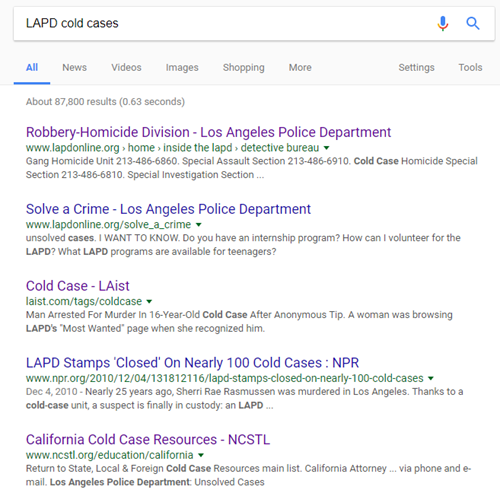
With a case like Lydia’s that is over 70 years old, I wouldn’t expect to pull it up in an online database (though you never know!) But I do see several sites here that provide phone numbers to gain access to those who can lead you in the right direction.
2. Search Google for clues.
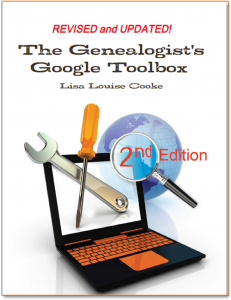 Use Google’s powerful search technology to look for online mentions of the names, places, and dates of your particular case.
Use Google’s powerful search technology to look for online mentions of the names, places, and dates of your particular case.
In Lydia’s case, she might begin with keywords relating to her great-grandfather’s disappearance, with his name, year, and the place he was last seen. Including descriptive keywords such as disappear, mystery, vanished or murder might also yield helpful results.
Learn more about effective search techniques in my book, The Genealogist’s Google Toolbox, Second Edition.
3. Check old newspapers.
Newspapers in your ancestor’s hometown (or further afield) may have mentioned the incident. With a common name like William (or Bill) Nelson, you may need to weed out the overabundance of unwanted results you get. Let me show you how I did this in
GenealogyBank, a popular genealogical newspaper website:
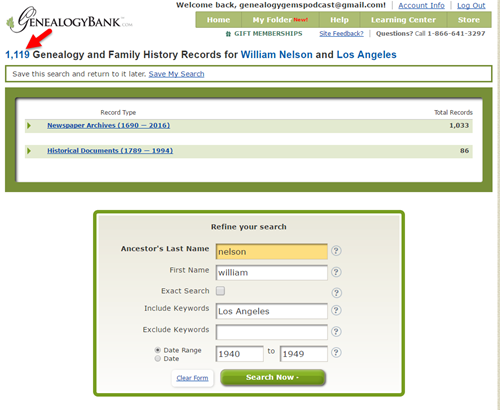
The initial results of searching GenealogyBank (above) for the terms William Nelson and Los Angeles brought up over 1,000 search results! (The red arrow points to the tally.) Since I don’t like wasting valuable research time on irrelevant results (who’s with me?!), I refined the search. I specified Nelson as a last name, William as a first name, Los Angeles as a keyword, and I added a date range: the decade during which he disappeared. Next, I limited my search to Los Angeles-area newspapers, shown below:
This search narrows results down to under 200: a robust number, but at least manageable to look through for relevant material.
I want to be able to use these same search parameters in the future, so I click
Save My Search. The search now appears in
My Folder for future reference.
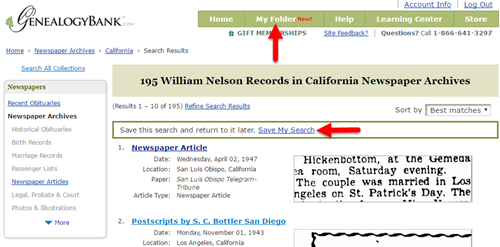
4. Look for criminal records.
 If you knew (or suspected) that a relative was prosecuted for a crime, it’s time to start looking for records relating to the criminal case. There may be several kinds:
If you knew (or suspected) that a relative was prosecuted for a crime, it’s time to start looking for records relating to the criminal case. There may be several kinds:
- In cases of suspicious death (where there was a body, unlike Lydia’s case), look for any surviving coroner’s records.
- If a trial may have occurred, research the jurisdiction to find out what court would have handled it, and then look for files relating to the case.
- If an ancestor may have served time, look for prison records. Genealogy Gems Premium podcast episode 29 is devoted to the topic of prison records.
Get inspired!
Read this article about a woman who was researching not one but two mysterious deaths on her family tree.
Want to help investigators lay to rest their own cold cases?
Click here to read about the Unclaimed Persons Project and how you can help.

by Lisa Cooke | May 20, 2016 | 01 What's New, Records & databases
 Here’s this week’s collection of new genealogy records online for New Spain, England, Ireland, the U.S. and the Kindgom of Hawaii.
Here’s this week’s collection of new genealogy records online for New Spain, England, Ireland, the U.S. and the Kindgom of Hawaii.
FEATURED COLLECTION: NEW SPAIN/NEW MEXICO. Ancestry.com has posted a new collection of land records for what is now New Mexico when it was part of Spain. These records span 1692-1846, come from the Twitchell compilation of materials from New Mexico’s Spanish Archives, and are only searchable by keyword and date. See the collection description for more details.
ENGLAND – BURIALS. Over half a million records have been added to Findmypast’s collection of Westminster burials. These include names, birthdates, , death and burial dates and where they were buried.
ENGLAND AND SCOTLAND. About 13.5 million new newspaper articles have been added to Findmypast’s British Newspapers collection. New titles cover Cheshire, Essex, Kent, Lancashire, Wiltshire, Yorkshire and Scotland.
ENGLAND – LONDON – MISC. A new online collection at Findmypast.com “details the lives of ordinary and common Londoners” from 1680-1817. The 1.5 million records include criminal registers, apprentice records, coroner inquests, workhouse minutes, clerks’ papers and more.
ENGLAND – SURREY. A new Ancestry.com collection of water rate books for Surrey, England is now available online. According to the collection description, “Rates were collected in each parish for support of the sick and poor, maintenance of roads and church, and other parish expenses.” You can expect to find names along with street names and dates.
GERMANY. Ancestry.com has posted two new databases of Lutheran baptisms, marriages and burials for Hesse, Germany. Over 2.5 million records are in one database for 1661-1875 and another 100,000 or so appear in an overlapping database for 1730-1875.
IRELAND. A collection of Dublin Metropolitan Police prisoner’s books are now online at the University College Dublin website. According to the collection abstract, “The Dublin Metropolitan Police (DMP) Prisoners Books for 1905-1908 and 1911-1918 are amongst the most valuable new documents to come to light on the revolutionary decade. They include important information on social and political life in the capital during the last years of the Union, from the period of widespread anticipation of Home Rule, to the advent of the 1913 Lockout, the outbreak of the First World War, the Easter Rising and its aftermath, including the conscription crisis of 1918. They will also be invaluable to those interested in criminology, genealogy, and family history.”
U.S. – CENSUS. Ancestry.com has updated its 1920 U.S. Census collection. The nature of the updates aren’t described. (About a year ago we mentioned FamilySearch’s re-indexing of parts of the 1910 census in this blog post.)
U.S. – HAWAII. Ancestry.com has posted a new collection of Hawaiian passport records for 1849-1950 and 1874-1900. These records were under the jurisdiction of the former Kingdom of Hawaii.
 Every week we post new genealogy records online! Are you getting our free weekly e-newsletter so you can stay up to date? When you subscribe you’ll receive a free e-book on Lisa Louise Cooke’s Google search strategies for genealogists. Enter your email address on this page.
Every week we post new genealogy records online! Are you getting our free weekly e-newsletter so you can stay up to date? When you subscribe you’ll receive a free e-book on Lisa Louise Cooke’s Google search strategies for genealogists. Enter your email address on this page.


 Use Google’s powerful search technology to look for online mentions of the names, places, and dates of your particular case.
Use Google’s powerful search technology to look for online mentions of the names, places, and dates of your particular case.
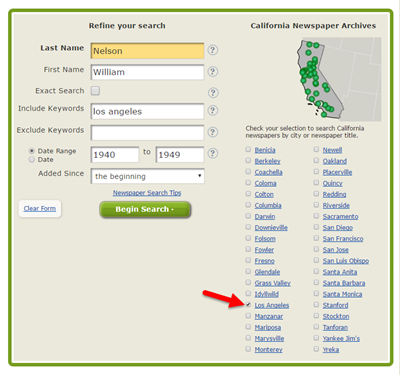

 If you knew (or suspected) that a relative was prosecuted for a crime, it’s time to start looking for records relating to the criminal case. There may be several kinds:
If you knew (or suspected) that a relative was prosecuted for a crime, it’s time to start looking for records relating to the criminal case. There may be several kinds:

 Here’s this week’s collection of new genealogy records online for New Spain, England, Ireland, the U.S. and the Kindgom of Hawaii.
Here’s this week’s collection of new genealogy records online for New Spain, England, Ireland, the U.S. and the Kindgom of Hawaii. Every week we post new genealogy records online! Are you getting our free weekly e-newsletter so you can stay up to date? When you subscribe you’ll receive a free e-book on Lisa Louise Cooke’s Google search strategies for genealogists. Enter your email address on this page.
Every week we post new genealogy records online! Are you getting our free weekly e-newsletter so you can stay up to date? When you subscribe you’ll receive a free e-book on Lisa Louise Cooke’s Google search strategies for genealogists. Enter your email address on this page.


